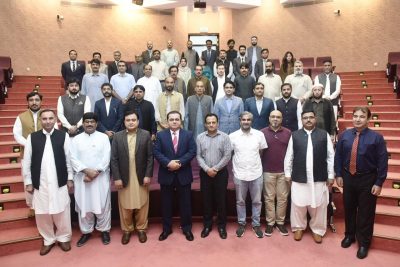
The Pakistan Institute for Parliamentary Services (PIPS) commenced a three-day National Workshop on “Assisting Members in Assembly Business & Using E-Office and AI Tools” for officers of the Senate Secretariat, National Assembly, and Provincial/Legislative Assemblies across Pakistan at the PIPS, Islamabad.
The programme opened with a recitation from the Holy Quran by Qari Anees-ur-Rehman. Welcoming the participants, Ms. Samer Awais, Director General (Parliamentary Development Programme & Coordination), PIPS, outlined the objectives and structure of the workshop.
In his opening remarks, Mr. Asim Khan Goraya, Executive Director, PIPS, underscored the vital role of parliamentary officers in strengthening democratic institutions through timely and professional support to Members. He noted that global legislatures are increasingly adopting Artificial Intelligence to enhance committee support, legislative drafting, and research services. He encouraged active participation and emphasised that the workshop aims to equip officers with practical skills in applying AI and e-office tools to day-to-day work.
The inaugural session, “Emerging Trends in Office Work – Use of Artificial Intelligence,” was delivered by seasoned technologists Mr. Shaji Ahmed and Mr. Ali Raza (Code for Pakistan). They discussed opportunities and challenges associated with AI in parliamentary work and introduced a range of tools, such as Perplexity, Napkin, Grok, Copilot, Gemini, and Notebook LLM.
In the afternoon, Ms. Iffat Mustafa, D.G. Research & Coordination, Senate Secretariat, delivered a session on Engineering Prompts for Parliamentary Business. She framed AI as a powerful but fallible assistant—comparable to a “brilliant new intern”—that requires constant supervision. She emphasized the importance of crafting precise, context-rich prompts to generate accurate outputs for legislative research and briefing. Key guidelines included verifying AI-generated content against authoritative sources, avoiding the input of confidential or draft legislative material into public AI platforms, and protecting sensitive data. Her message was clear: AI should support, not replace, human judgment, especially in constitutionally sensitive environments.
On Day 2, Ms. Rabeea Anwar, Additional Secretary (Committees), Senate Secretariat, led a session on Assisting Members in Legislative and Non-Legislative Business: Discussion on Challenges in Facilitation. Rooted in Article 87 of the Constitution, which guarantees parliamentary independence through a dedicated Secretariat, she highlighted the critical role of officers in enabling Members to perform their duties. She detailed support functions across legislative business—such as bill drafting, constitutional vetting, committee scrutiny, and debate briefings—and non-legislative functions including questions, motions, resolutions, and calling attention notices. Common challenges included tight deadlines, understaffing, delays in ministry responses, and adapting to new technologies. As solutions, she advocated for continuous training, development of knowledge repositories, inter-institutional coordination, and the strategic use of AI and E-Office to enhance efficiency and accuracy.
This was followed by a presentation from Mr. Saddam Hussain, Manager Implementation, NITB, on E-Office Implementation in Pakistan: Progress, Challenges, and Opportunities. Drawing on data from October 2024 to February 2025, he shared that the system has processed 1.85 million files created and over 4.1 million file movements, with 134,485 summaries generated. A key efficiency gain highlighted was the reduction in internal file processing time—from a minimum of 58 minutes in physical systems to just 17 minutes digitally. Inter-ministerial routing, which previously took up to five days, has been significantly expedited. Environmentally, the system has saved paper equivalent to over 134,000 trees, based on the standard measure of 10,000 pages per tree. Operationally, e-Office costs PKR 81.26 million annually, a fraction of the estimated PKR 300 million saved in stationery, energy, logistics, and infrastructure. The system is secured through robust measures including data encryption, multi-factor authentication, disaster recovery, and endpoint protection, ensuring secure and transparent governance.
On Day 3, Mr. Iftikharullah Babar, Former Secretary, Senate of Pakistan, delivered a comprehensive session on Managing Committee Business and Minutes Writing. He defined the Secretary Committee as an impartial officer responsible for coordinating committee work, maintaining official records, and ensuring compliance with the Rules of Procedure. He emphasized the Secretary’s role as an advisor, facilitator, and coordinator—apolitical and directly accountable to the Chairperson. Key procedural elements included verifying quorum, managing requisitioned meetings, ensuring jurisdictional compliance, and maintaining confidentiality. On minutes writing, he outlined three types—Action, Verbatim, and Discussion Minutes—and stressed drafting in the past tense, using third-person narrative, avoiding personal views, and accurately reflecting decisions with context. He advised against reliance on audio recordings and emphasized immediate transcription, proper grammar, and sensitivity in language, particularly when reporting criticism or appreciation. Draft reports, he noted, must be placed on the agenda of the next meeting for formal adoption.
The workshop concluded with a dedicated feedback session involving officers from the National Parliament and Provincial and Legislative Assemblies. Participants unanimously described the workshop as highly useful from a learning perspective, particularly in understanding AI integration and digital workflow optimization. Several offered constructive suggestions for future editions, including more hands-on AI training, in-depth sessions on e-Office troubleshooting, and expanded modules on committee reporting standards. These recommendations have been documented for inclusion in future capacity-building programs.
The workshop successfully equipped parliamentary staff with practical insights into leveraging technology for enhanced efficiency, transparency, and legislative support—reinforcing PIPS’s role as a catalyst for modernizing parliamentary practices in Pakistan.